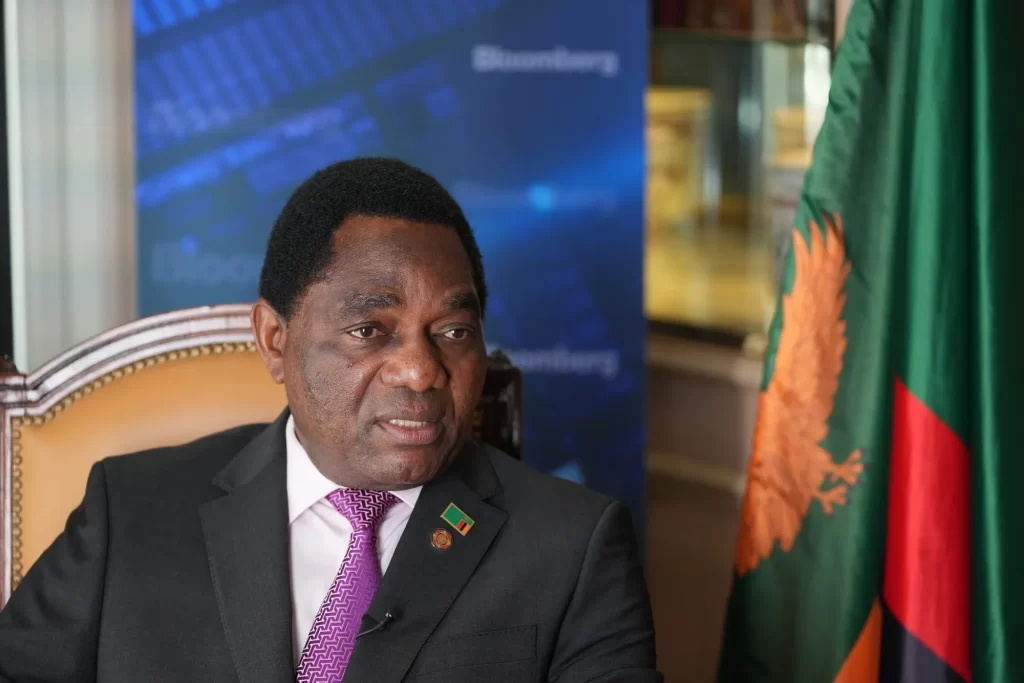Controversy Erupts as Zambian President Suspends Judges Amid Political Tensions
3 min read

Zambia is facing rising political tensions following President Hakainde Hichilema’s decision to suspend three prominent judges, a move critics are labeling as political interference in the judiciary. The judges—Justice Annie Sitali, Justice Mungeni Mulenga, and Justice Palan Mulonda—are under scrutiny for their past rulings, including decisions that have significant implications for Hichilema’s political rival, former President Edgar Lungu.
In 2016, these judges played a crucial role in dismissing Hichilema’s petition challenging Lungu’s election victory. Their actions did not stop there; they were also involved in a contentious ruling that allowed Lungu to run in the 2021 elections, despite having already served two terms as president. This history has only intensified the scrutiny surrounding their recent suspension, particularly with the next elections scheduled for 2026, when Hichilema and Lungu are expected to face off for a fourth time.
The judges were set to participate in a crucial case that would determine Lungu’s eligibility to contest in the upcoming elections. Their suspension was reportedly based on recommendations from the Judicial Complaints Commission (JCC), which had been investigating the judges following a complaint lodged by Joseph Busenga, a lawyer and current diplomat at the Zambian embassy in Belgium. Busenga alleged that the judges mishandled the 2016 presidential election petition, asserting that they acted inappropriately when ruling against Hichilema and favoring Lungu.
The Zambian presidency announced the suspensions, stating they were in line with the powers vested in the president, though it provided little additional detail. The swift action has sparked fierce reactions across the political landscape. The Patriotic Front (PF), Lungu’s party, condemned the suspensions as illegal. Lungu himself urged Zambians to stand up against what he characterized as an injustice inflicted on the judiciary, warning that losing judicial independence would have dire consequences for the nation.
Activists and political analysts have also weighed in, accusing Hichilema of undermining judicial independence. Laura Miti, a social and political commentator, suggested that while the judges may have acted improperly, the president’s motivations appear to stem partly from a desire for revenge. Miti expressed her concerns on social media, stating, “The judges harmed the country, and now the president is doing the same.”
The timing of the suspensions is particularly striking, coming just two days before the Constitutional Court is scheduled to hear Lungu’s reopened eligibility case. Lungu has publicly announced his intention to mount a political comeback, adding urgency to the situation. Political analyst Sishuwa Sishuwa warned that Hichilema’s actions represent a dangerous game, reflecting a desire to exclude Lungu from the political arena.
Following their suspension, the judges will undergo a disciplinary process, which could result in either their removal from the bench or reinstatement. This process underscores the complexities of Zambia’s judicial system, where judges, including the chief justice, are appointed by the president based on recommendations from the JCC and require approval from the National Assembly. Critics argue that this framework compromises judicial independence, particularly when the president wields significant influence over both appointments and removals.
The backlash against Hichilema’s decision to suspend the judges has sparked broader discussions about the state of democracy and the rule of law in Zambia. Many observers worry that the independence of the judiciary is under threat, with the current government’s actions potentially leading to a politicized legal system.
As Zambia approaches a critical electoral period, the implications of this suspension may reverberate far beyond the courtroom. The country is at a crossroads, and how these judicial matters unfold could significantly impact its political landscape. With tensions running high, both the government and the judiciary must navigate these turbulent waters carefully to maintain public trust and uphold the principles of justice.